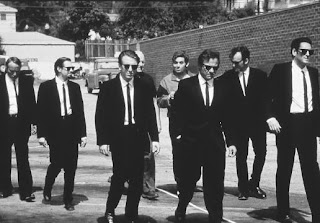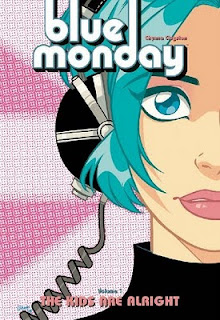
It’s 3AM.
It’s also almost Halloween, which is the perfect time for me to inform you, if you didn’t already know, that I’m a horror writer. That’s right, horror. Considering that many literary agents, per my handy copy of “Jeff Herman’s Guide To Book Publishers, Editors, & Literary Agents,” lump horror into the classification of things they DON’T want to represent, along with sci-fi, fantasy, westerns and porn--I think this is a brave thing to come forward with.
In the recent “book in a month” class I took at the Loft, I was the first writer to volunteer to read a chapter in class. Afterwards, there was a stunned silence. The teacher was the first to break the ice saying:
1) “Looking at you, Mark, I wasn’t expecting that type of story.” And
2) “That was genuinely creepy.”
Some writers when told that their work is creepy might be discouraged, but well, that’s where us horror writers differ: guy-next-door types who blend in pretty well until you see what we put on the page. The rest of the comments in class generally concurred. Chillling, scary stuff. I made a note: Keep doing more of this.
Recently I was amused by a fellow writer who shared that while writing a climactic and scary scene for his mystery novel in progress that his imagination got the best of him and he imagined a raccoon, yes, a raccoon, entering his basement and was unable to finish any writing that night. I didn’t have the heart to tell him that in my last writing session (plenty late at night) the body count had added up to six dead in that session alone, or six billion, depending on who you want to consider dead--or undead. Raccoon? Us horror writers aren’t afraid of no stinking raccoons.
So why do I write horror?
There are probably lots of reasons, but for starters, blame my parents, or more particularly, my father. I have some strong childhood recollections of sitting in my father’s den playing while he smoked Carter Hall tobacco and read the latest Ray Bradbury book or Alfred Hitchcock's Mystery magazine.
When I finally started doing my own reading I was hopelessly lost, drawn to books by Stephen King and Ray Bradbury and short story collections with titles like, “Book of the Dead” and “Horror Times Ten.” (The latter contains a really good August Derleth story called “The Lonesome Place” that still gives me chills when I think of it).
My parents taste in literature didn’t fall far from their taste in TV and movies, either. I have just as many memories sitting between my parents on a weekend with a bowl of popcorn watching black and white Twilight Zone episodes and Saturday afternoon Creature Features like “The Blob,” “The Island of Lost Souls” and “The Fearless Vampire Hunters.” My parents also managed to expose me to my first ever walking dead movie at the age of seven. I was supposed to be sleeping while they watched “Night of the Living Dead.” I managed to see most of it in its entirety—which ultimately kept me, and them, up most nights for the rest of the month with nightmares.
In a screenplay class (another Loft offering) I took within the last year another student asked the instructor: “So what is the point of all the really bad horror movies out there? Or for that matter, the point of horror at all?”
I wasn’t about to defend some of the crap movies that the class started to name, but I did feel compelled to mention box office hits like Jaws, Alien, Seven, Psycho, Silence of the Lambs, and so on, that were well written and directed and contain not just terrifying villains but equally strong main characters who must overcome horrifying creatures and circumstances to live, survive, grow and hopefully make it out of their stories alive. To me, good horror follows all the other rules of good story telling. Just because it’s scary doesn’t mean it can't be damned good writing.
Getting back to those agents who openly say they don’t want to agent horror—it is interesting to me just based on the sheer success of many horror books and movies. What publishing house wouldn’t want another book like “The Stand” or a series (even though I’m no fan) like “Twilight”? (If it’s got vampires in it, it’s got to have some horror elements, yes?) I can only guess that maybe it’s because of the sheer number of bad/unoriginal stories that are out there for every truly good one.
So there are probably many other reasons why I enjoy reading and writing horror, but I suppose ultimately it’s because that’s how I’m built. These are the sorts of stories that interest me and I want to tell. Supposedly when Stephen King was asked why he writes horror, he replied, “What makes you think I have a choice?”
Ditto for me.
Below are some links (sorry, I’m not taking the time to make them pretty), a couple of them to some of my favorite scary stories.
Happy Halloween. I’m going to bed.
One of my favorite Halloween stories, Ray Bradbury’s October Game:
http://www.october-country.com/wychingwell/ww-bradbury_01.html
GoodReads scariest book list: http://www.goodreads.com/list/show/121.Scariest_Books
(I’ve ready about half of this list)
Supernatural fiction database: http://freepages.pavilion.net/tartarus/d9.htm
The Monster Club.Com sci-fi horror collection: http://www.themonsterclub.com/radiolibrary.htm
Per their own instructions, use the password Boo13 (I notice another of Bradbury’s stories in the mix: Zero Hour)
Note: The image accompanying this post is part of one of my paintings. Scary art is fun, too.




